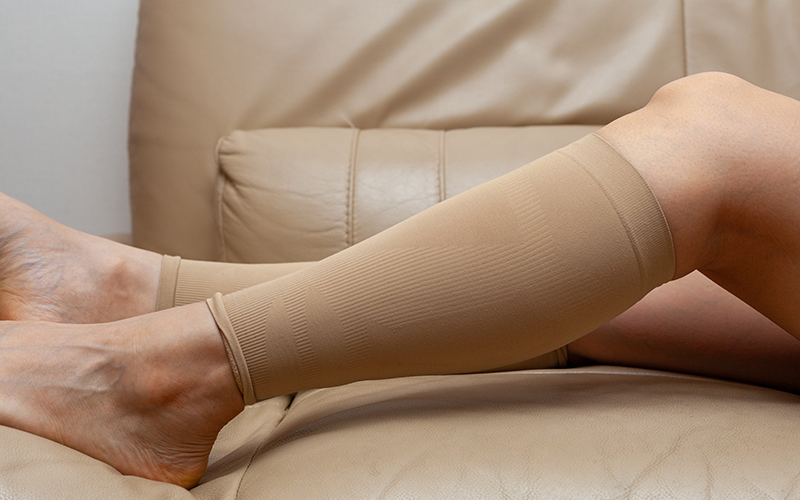Does Medicare Pay for Compression Stockings?
Compression stockings are often prescribed to people dealing with circulation problems, swelling, or certain medical conditions. These medical garments are not just about comfort, they can play an vital role in preventing complications and supporting overall health.
Many people who receive a prescription naturally wonder: does Medicare pay for compression stockings? The answer is not always straightforward, since coverage depends on the type of Medicare you have, your medical diagnosis, and whether your doctor determines they are medically necessary.
Below, we’ll walk through how Medicare approaches coverage for compression stockings, what qualifies as medically necessary, and what options you may have if Medicare does not fully cover them.
Original Medicare does not generally cover compression stockings used for comfort, mild swelling, or prevention. However, in some instances where stockings are considered medically necessary, for example, after surgery or to treat a diagnosed vein condition, they may be covered under specific parts of Medicare.
Medicare evaluates whether compression stockings are a form of treatment rather than a convenience. If a doctor prescribes them to treat an approved condition, there is a higher chance of coverage.
What Are Compression Stockings And How Do They Work?
Compression stockings are snug-fitting garments worn around the legs. They apply gentle pressure to help veins move blood more effectively. This pressure reduces swelling, lowers the risk of blood clots, and eases discomfort caused by poor circulation.
Doctors often recommend them for conditions such as varicose veins, chronic venous insufficiency, or after certain surgical procedures. Some people use them when sitting for long periods, such as during travel. Still, those uses are generally considered preventive and not usually covered by Medicare.
Are there different types of compression stockings covered by Medicare?
Yes, compression stockings come in several varieties. The most common types are:
- Graduated compression stockings: These apply the most pressure at the ankle and gradually reduce compression up the leg.
- Anti-embolism stockings: Often prescribed after surgery, these help control blood clots in patients with limited mobility.
- Non-medical support stockings: These provide mild compression and are available over-the-counter, but Medicare does not usually cover them.
Medicare coverage usually applies only to stockings prescribed by a doctor for specific medical conditions. Over-the-counter stockings or those purchased for general wellness are not covered.
How many pairs of compression stockings will Medicare cover?
If coverage is approved, Medicare typically limits the number of pairs you can receive. The exact number depends on the medical necessity outlined by your physician. Medicare will not cover unlimited replacements. Instead, you may be eligible for a set number of stockings within a specific period.
It’s important to check with your provider and plan to understand how often replacements are allowed, since coverage rules vary.
Does Original Medicare cover compression stockings?
Original Medicare, which includes Part A and Part B, has limited coverage for compression stockings. Generally, Medicare Part B may cover them if they are prescribed as durable medical equipment or as part of wound care treatment for conditions like venous stasis ulcers.
However, Original Medicare usually does not cover stockings for common vein problems or mild swelling. Beneficiaries are often surprised by these restrictions, so it’s essential to confirm with your provider before assuming coverage.
Which medical conditions or diagnoses qualify for Medicare coverage of compression stockings?
Medicare coverage is generally reserved for conditions where compression stockings are proven to improve outcomes. These may include:
- Chronic venous insufficiency with leg ulcers
- Deep vein thrombosis recovery
- Lymphedema with complications
- Post-surgical prevention of blood clots
- Severe circulation disorders diagnosed by a physician
If your doctor prescribes compression stockings for one of these conditions and documents medical necessity, Medicare is more likely to provide coverage.
Does Medicare Advantage offer better coverage for compression stockings?
Medicare Advantage (Part C) plans often expand benefits beyond what Original Medicare covers. Some Medicare Advantage plans may provide additional coverage for compression stockings, particularly when prescribed for chronic conditions or recovery after surgery.
Since Medicare Advantage plans are presented by private insurers, benefits vary. If compression stockings are important for your health, it may be worth comparing different Medicare Advantage plans to see which provides the best support.
How much do prescription compression stockings cost with Medicare?
The out-of-pocket cost depends on whether you hold Original Medicare or a Medicare Advantage plan, and whether your doctor prescribes the stockings as medically necessary. Even when coverage applies, you may still be responsible for part of the cost through coinsurance or deductibles.
If Medicare denies coverage for your stockings, the entire cost may fall to you. That’s why understanding the criteria before purchase is essential.
Are there savings options for compression stockings outside of Medicare?
Yes, if Medicare does not cover your stockings or only partially covers them, there are alternatives to reduce costs. Options may include:
- Supplemental insurance (Medigap): Some Medigap plans may help with out-of-pocket costs when Original Medicare provides partial coverage.
- Medicare Advantage extra benefits: Certain plans may cover more pairs or broader use of stockings.
- Discount programs and retail promotions: Pharmacies and online suppliers sometimes offer discounted compression stockings.
- Health Savings Accounts (HSA) or Flexible Spending Accounts (FSA): If you have these accounts, they can often be used to pay for prescribed stockings.
Conclusion
Compression stockings play a critical role in managing circulation issues and preventing complications for many individuals. Still, the answer to does Medicare pay for compression stockings depends heavily on your diagnosis, the medical necessity outlined by your doctor, and the type of Medicare plan you carry.
If you believe compression stockings are essential for your health, start by speaking with your doctor about whether they can be considered medically necessary under Medicare guidelines. From there, contact your plan provider to confirm what coverage is available to you. Exploring Medicare Advantage or supplemental insurance may also give you more options if Original Medicare falls short.
Being proactive, asking the right questions, and reviewing your Medicare plan’s details will help ensure you get the support and coverage you need for compression stockings and your overall health.
Disclaimer: This article is for informational purposes only. Medicare coverage and costs can vary by region, plan type, and individual circumstances. Always speak directly with your provider or Medicare representative for the most accurate information.
Source: healthcare.gov
 888-313-0044
888-313-0044



